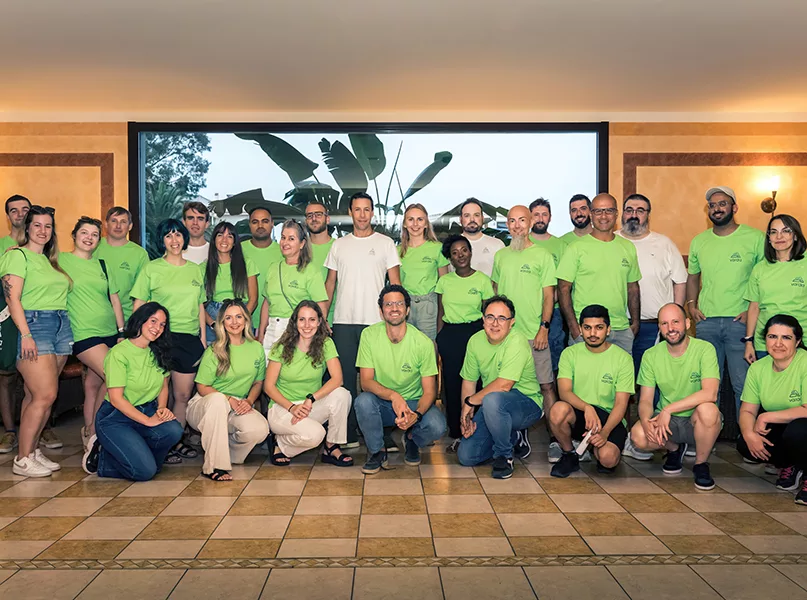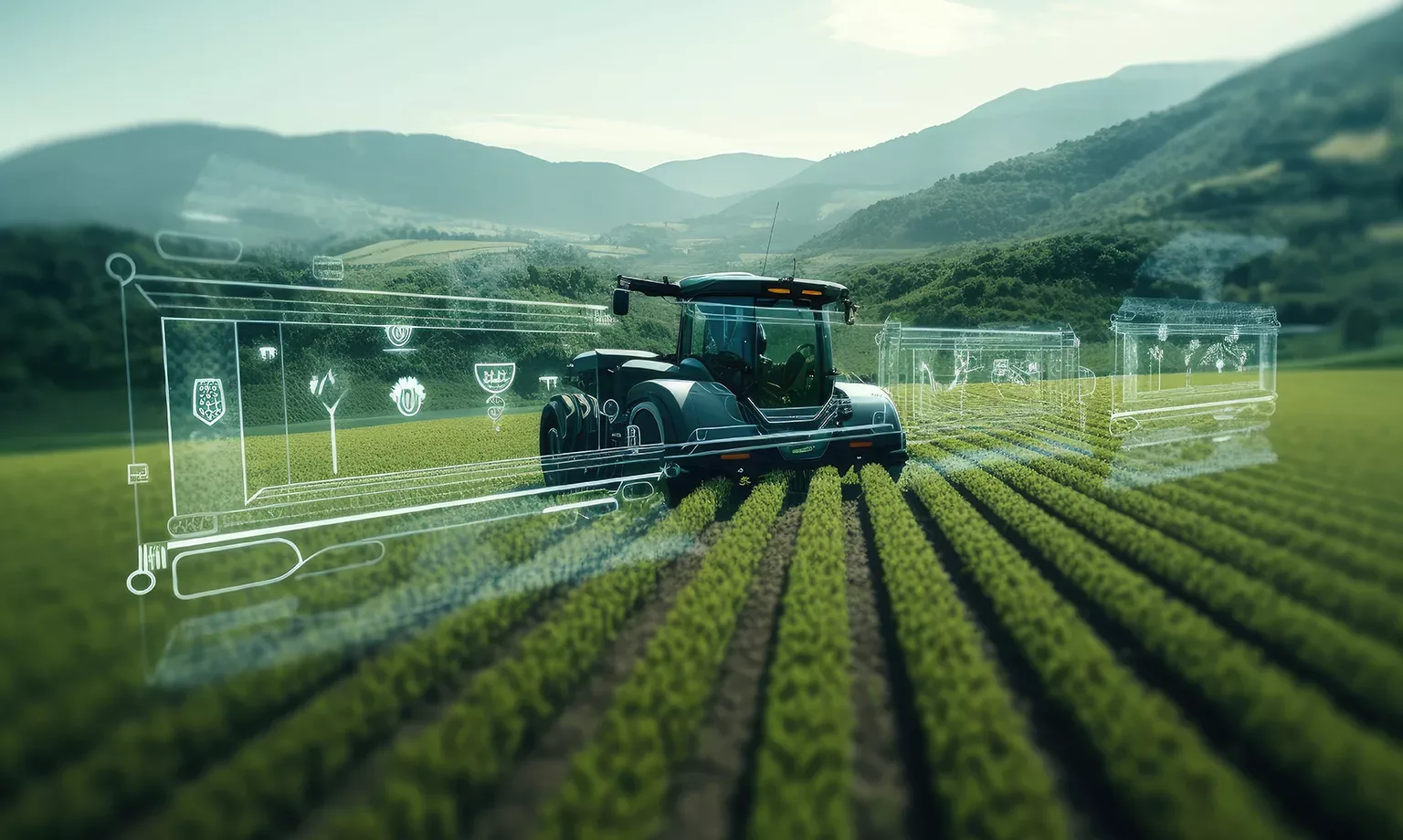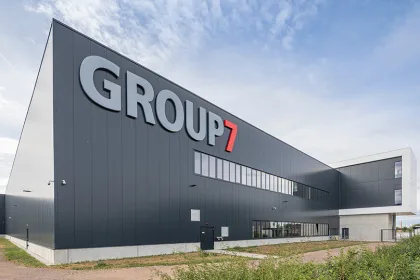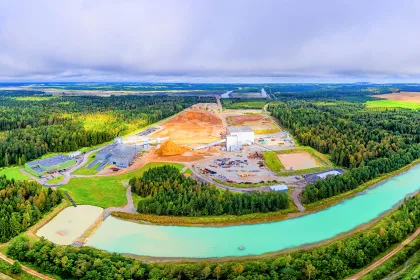The AgriTech sector is on the precipice of transforming worldwide food security and farming precision. Davide Ceper, CEO of Varda, highlights how the company is spearheading the use of data to have a tangible, sustainable impact on the agricultural supply chain.
FARMING FOR THE FUTURE
As a forward-thinking AgriTech start-up, Varda was established in 2021 to elevate the sustainability practices of the agricultural sector and reduce carbon emissions with its innovative infrastructure, Global FieldID (GFID).
The cutting-edge digital infrastructure has revolutionised the industry by assigning unique alphanumeric codes to agricultural fields worldwide and enables the seamless sharing of field-level data within the farming community.
The most groundbreaking aspect of GFID, however, is its enhancement of data traceability, transforming sustainable farming from an aspirational concept into a practical, verifiable reality.
Currently, GFID encompasses over 116 million field boundaries and is available in a plethora of countries including France, the Netherlands, Poland, Germany, Belgium, Italy, Spain, Brazil, the US, and the UK.
We speak to CEO, Davide Ceper, who enlightens us about the next chapter in the AgriTech sector which brings to the fore the benefits of field-level data analysis and how it is unlocking a nature-positive food system.
Q&A WITH DAVIDE CEPER, CEO, VARDA
Can you tell us more about Varda’s mission to enable the use of field-level data to accelerate the transition towards a nature-positive food system?
Davide Ceper, CEO (DC): Our core objective is to support the agricultural sector and agribusiness in its shift towards a nature-positive food system. This system is designed to generate enough food to satisfy global needs while maintaining soil health and nature’s biodiversity.
Creating a nature-positive food system starts right from the beginning of the food chain. Ensuring effective methods of regenerative farming is key, and directly impacts the sustainability of the products sold by food companies further down the supply chain.
Central to achieving a nature-positive food system is the necessity for enhanced insights into field data and improved data granularity, which are crucial for increasing efficiency and encouraging better collaboration.
GFID offers a comprehensive data infrastructure that connects farmers, agronomists, and agribusinesses with various digital farming tools, thereby enhancing communication with external stakeholders.
The process starts with each plot of land receiving a unique GFID. The platform processes the field boundary data, cleanses and validates it, and assigns a distinct alphanumeric code. It is easily accessible via its user interface and as an application programming interface (API), allowing it to seamlessly integrate with other platforms. It simply serves as a ‘plugin’, saving developers time by automatically syncing updates across all linked GFID applications.
Users can locate a field by sharing a specific point or area on the map. If a field isn’t already listed, users have the option to add it by drawing or uploading a new field boundary. The GFID API also provides a map of all field boundaries in the system, streamlining the onboarding process for new users by allowing them to import their fields without the need to define them repeatedly – all while adhering to data privacy laws. Traders can record crop origins and share the associated GFIDs with buyers for easy access to field information.
By providing precise and comprehensive field data, we are empowering stakeholders to make informed decisions that align with environmental sustainability goals. This system encourages practices that prioritise soil health, reduce the carbon footprint in farming, and promote biodiversity, all of which are essential elements of a nature-positive approach.
Through enhanced data transparency and traceability, GFID enables a more responsible and efficient use of resources. It also fosters collaboration between various entities in the agricultural supply chain, helping to create a more cohesive and sustainable food production ecosystem.
By bridging the gap between digital technology and sustainable farming practices, Varda is not just contributing to the production of sufficient food but is also ensuring that production is in harmony with preserving the natural environment.

To achieve this mission, how is Varda tackling the challenge of data fragmentation and lack of standards of data produced on farms?
DC: At the heart of our mission is the GFID system, which significantly contributes to standardising and organising farm data.
It begins with the standardisation of field information. By assigning a unique alphanumeric code to each plot of land, the industry can deal with the inconsistency and fragmentation of data across different farms and regions. By establishing a universal standard for field identification, Varda ensures that data from various sources can be integrated and compared effectively.
In addition, our platform is adept at integrating diverse data sources. It is engineered to consolidate information from multiple digital farming tools, sensors, and external partners into a unified dataset. This integration is key in creating a comprehensive and coherent data repository, which is much easier to analyse and use for decision-making.
Accessibility is also a cornerstone of our strategy. GFID is accessible through both a user-friendly interface and an API. This dual approach facilitates easy integration with existing farm management systems, enabling farmers and agribusinesses to adopt Varda’s platform without disrupting their existing workflows.
By providing a common platform for data sharing, we are bridging the gap between different stakeholders. This unified approach ensures that everyone works with the same data formats, fostering collaborative efforts towards sustainable agriculture.
Finally, with standardised and accessible data, the adoption of best practices in farming becomes more feasible. Farmers and agronomists are empowered to implement sustainable techniques essential for a nature-positive food system, guided by reliable data.
Can you tell us about your vision to make farm and field level data the key ingredient of the next ‘green revolution’, spreading its benefits across the whole ecosystem, from farmer to consumer?
DC: At the core of our vision is the idea that precise and accessible data can unlock immense potential in agriculture. For the farmer, this means access to actionable insights that can lead to more efficient use of resources, better crop management, and ultimately, higher yields and profitability. Data-driven practices enable farmers to make informed decisions, reduce waste, and adapt quickly to changing environmental conditions.
Beyond the farm, this revolution in data utilisation extends to the entire agricultural supply chain. Agribusinesses, food processors, and retailers can benefit from enhanced traceability and accountability in food production. This not only improves supply chain efficiency but also helps in meeting the growing consumer demand for sustainably produced food.
Moreover, this vision places a strong emphasis on environmental stewardship. By harnessing data for better management of land and resources, Varda contributes to the broader goals of carbon sequestration, soil health, and biodiversity conservation. This aligns with global efforts to mitigate climate change and protect natural ecosystems.
In terms of societal impact, our approach promotes equitable and sustainable food systems. By making advanced data tools accessible to farmers of all scales, including those in developing regions, Varda aspires to democratise the benefits of technological advancements. This inclusivity is crucial in ensuring that the gains of the ‘green revolution’ are shared widely, enhancing food security and livelihoods globally.
Ultimately, we envision a future where farm and field-level data are not just tools for individual farmers but catalysts for global change. This vision acknowledges the interconnectedness of our food systems and seeks to create a positive ripple effect from the ground up, benefiting everyone from the farmer tilling the soil to the consumer enjoying the harvest.
What recent or ongoing projects is the company proud of?
DC: To complement the efforts of GFID, Varda has recently announced the launch of its new platform: SoilHive. This programme facilitates access to soil data and data comparison across multiple sources, allowing stakeholders to make informed decisions that optimise soil health and bolster carbon sequestration.
SoilHive’s innovative features, such as the Data Availability Index (DAI) and agroecosystem filters, guide research and policy; it’s an invaluable tool to understand more clearly the thin layer of soil which carries so many key functions for humans and our ecosystem.
Together, these platforms underscore Varda’s commitment to a nature-positive food system by bridging data gaps and promoting collaborative insights into soil and field management.
The collective impact of GFID and SoilHive on carbon reduction will be significant. By enabling precise tracking and analysis of agricultural practices, these platforms help identify the most effective methods for carbon sequestration and the reduction of greenhouse gas (GHG) emissions. They empower farmers and stakeholders to implement and monitor sustainable practices that contribute to a reduction in the carbon footprint of agriculture. This data-centric approach facilitates targeted interventions, encouraging the growth of regenerative agriculture and supporting the development of “climate finance” tools that fund carbon farming or biodiversity programmes.
Looking ahead, what are Varda’s key priorities and goals for the year ahead?
DC: The scale of our products’ impact depends on the scale of adoption and use. In the coming year, we aim to expand the coverage of GFID to more countries in South America and Asia, and add features to the API that allow the upload of single field boundaries to give access to farmers, advisors, or companies that want to use the service in an area that hasn’t been added to the coverage yet.
Collaboration is at the core of the transition to a nature-positive food system, therefore, we plan to continue engaging partners to expand the adoption of the GFID system and succeed in creating the infrastructure that is needed to scale impactful change.



































